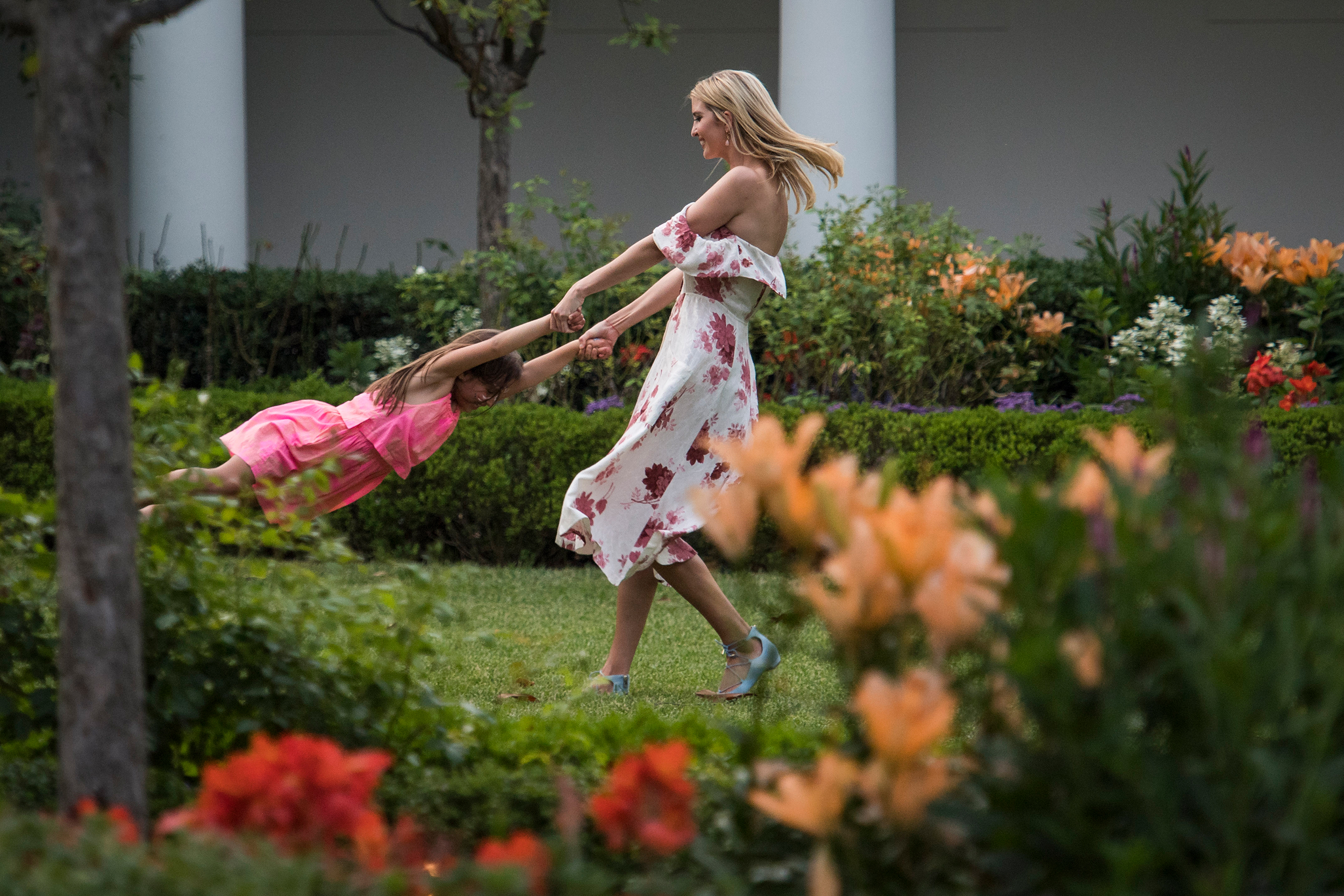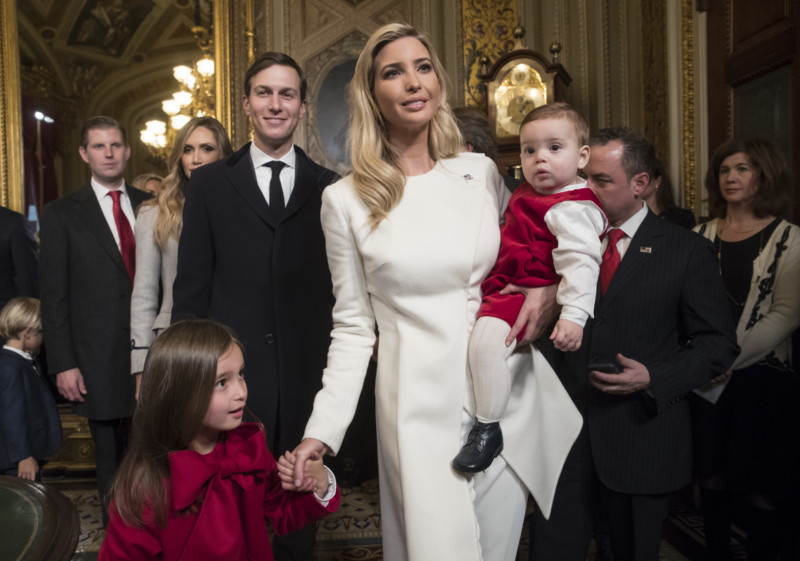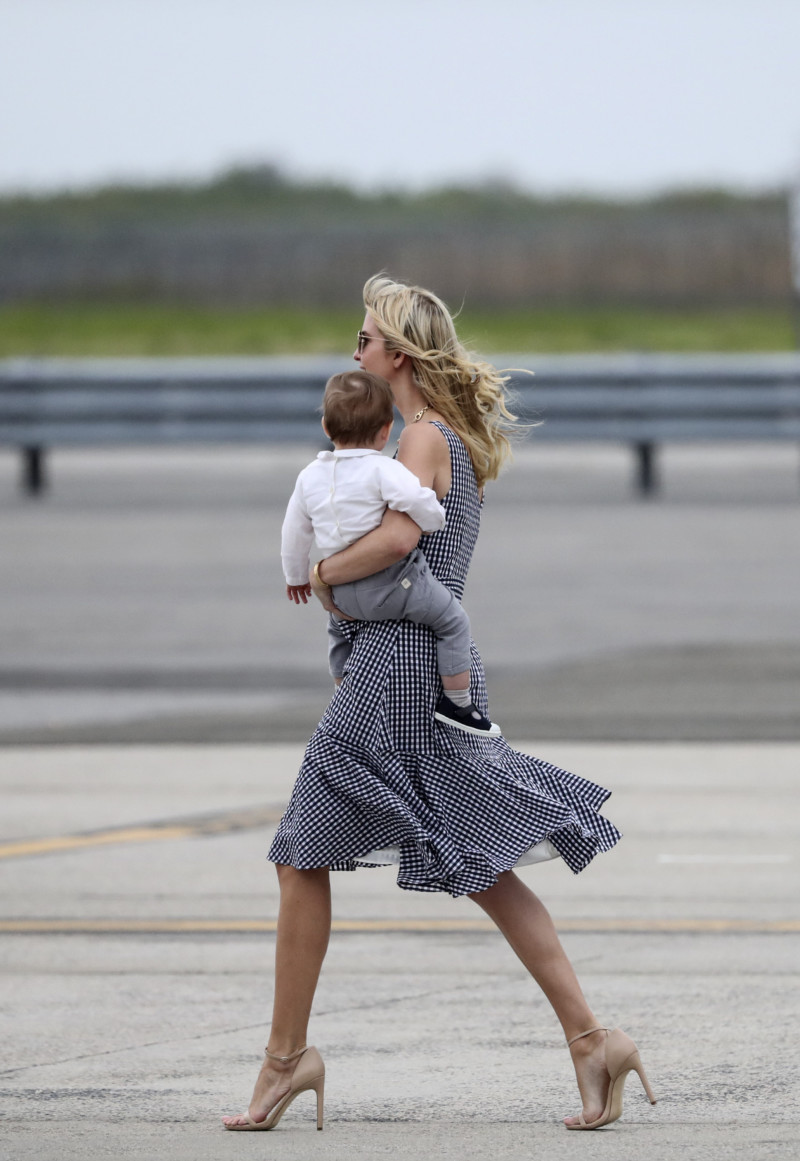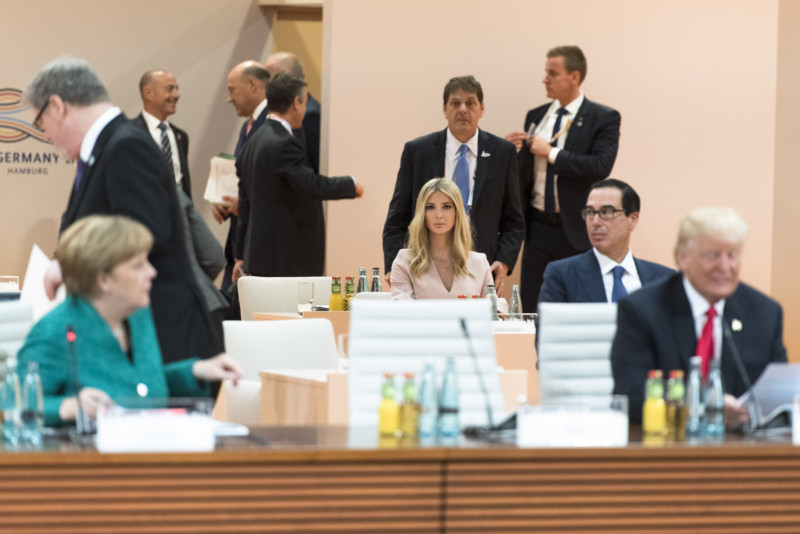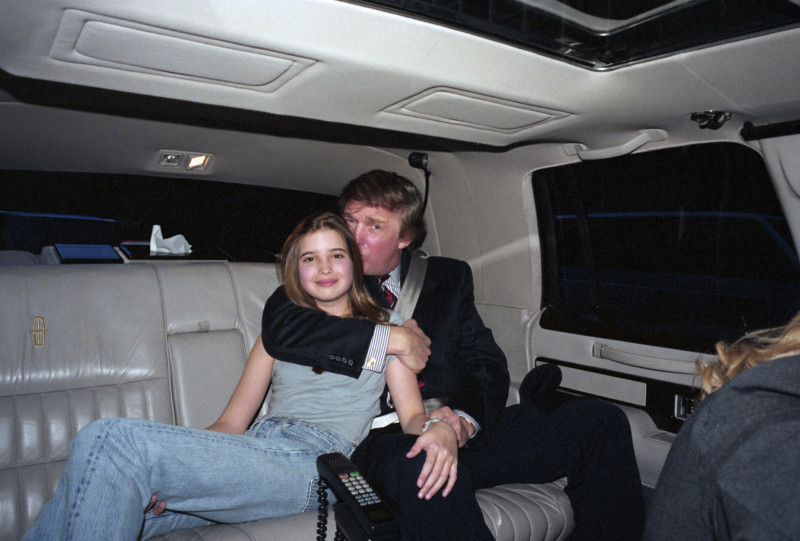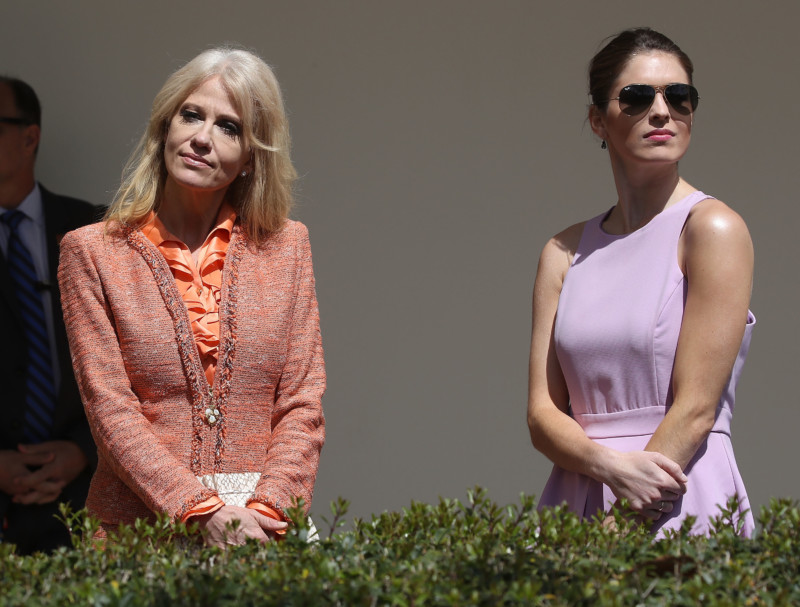On September 14, 2016, reporter Prachi Gupta was watching an interview with Ivanka Trump on Good Morning America. ABC News correspondent Amy Robach asked Ivanka about the Trump campaign’s recently released childcare proposal that guaranteed six weeks of paid leave for mothers, both biological and adoptive.
Two things, Gupta says, struck her about the almost six-minute morning show segment. One, Ivanka was leading the conversation. And two, there wasn’t enough probing about how the childcare policy was crafted and why it left out fathers.
A few hours later, when Gupta had the opportunity to speak with Ivanka for a Cosmopolitan piece on the initiative, she zeroed in on the exclusion of men and specifically why they weren’t entitled to parental leave. “Ivanka was frustrated with the line of questioning,” Gupta told me. The exchange got particularly tense when Gupta, now a senior reporter at Jezebel, brought up a comment Donald Trump had made in 2004 that pregnancy was an “inconvenience for a person running a business.”
ICYMI: The one “media world mystery” that remains unsolved around Weinstein scandal
That’s the moment, Gupta recalls, when Ivanka lost her composure. “She told me there was a lot of negativity in my comments and she insinuated that I made up what her father had said, even though there was a video of it. I don’t think I’ve ever had an interviewee accuse me of making something up.” Even if Ivanka never saw the clip, the real-estate heiress was employing tactics that had already become central to her father’s political rise: seeding doubt about established facts to strengthen her position and attacking the credibility of the news media.
The conversation ended abruptly, with Ivanka saying she had to “jump off.” Headlines splashed in many news outlets about Ivanka storming out of the interview, and lashing out at a reporter as the Cosmopolitan piece went viral. (“The reporter knew going into the interview that it would be brief because Ivanka was speaking from backstage before the taping of Dr. Oz, and the conversation only ended when it did because the show was starting,” a spokesman for Ivanka told Vanity Fair.) Media Matters, meanwhile, heralded Gupta for setting the standard on Ivanka Trump interviews because she relentlessly asked hard-hitting follow-up questions.
“I think Ivanka is pretty savvy, and I don’t think she’ll have another moment like she had with me, not for a long time,” Gupta said in a phone interview in August.
ICYMI: New York Times columnist lands in hot water
And Gupta is right. For the first nine months of her father’s presidency, Ivanka, who is 35 and a special assistant as well as daughter to the president of the United States, has succeeded at crafting and maintaining a narrative about her role in the White House that is consistent with her pre-election image: effective professional operator and careerist; smart and gracious ambassador for the Trumps; caring daughter, spouse, and mother; and advocate for women’s rights. Perhaps most impressively, more than any other presidential adviser, Ivanka has mostly preserved the public perception that she is a benevolent and moderating force, and repeatedly evaded blame in the press when scandal has struck the White House and the Trump Organization, where she was a senior executive until January. (We’re calling Ivanka by her first name throughout this piece to distinguish her from her father.)
Recently, this dynamic has started to shift, particularly on the opinion pages, where columnists are taking off their gloves. Lindy West wrote a scathing op-ed in The New York Times on September 6 proclaiming: “Ivanka Trump is never going to come through.” And Catherine Rampell didn’t mince words in her September Washington Post piece titled, “Ivanka Trump has learned well from her father’s cons.” While this commentary may seem tough, when it comes to accountability reporting, the First Daughter doesn’t face nearly the level of scrutiny that others in similar positions ordinarily would.
Instead, there’s a media echo chamber when it comes to Ivanka, with a barrage of pieces bemoaning the fact that she isn’t a true advocate for women, the climate, or the LGBTQ community. But those issues, may, in fact, be among the least problematic when it comes to the First Daughter, who is referred to behind her back by West Wing staffers as the “princess royal.” It’s worth asking why the news media seem to care more about Ivanka’s backing to end an Obama-era equal pay data rule than the fact she was the most senior member on a Trump Organization project in Baku, Azerbaijan, that three Democratic senators have sought to have investigated for a potential violation of the Foreign Corrupt Practices Act and other infractions. Ivanka’s lack of real girl power is certainly disappointing, but the Baku deal may have broken the law.
This all raises a broader question that has been under-explored: What role did Ivanka play in any number of troubled projects by the Trump Organization, where she served as executive vice president of development & acquisitions? We know from shoe-leather reporting in the Los Angeles Times last year that during her time as an executive at the Trump Organization, she was involved in a project in Baja, Mexico, in which buyers claimed they were misled and lost deposits. And there have been allegations of deception on another project, Trump SoHo, in which Ivanka also played a significant part. Special Counsel Robert Mueller’s team is now looking into questionable financing for Trump SoHo from Kazakhstan and Russia. And speaking of Russia, what about Ivanka’s role in Trump Tower, Moscow, which would have included an Ivanka Trump branded spa?
TRENDING: What my 18 months as Jared Kushner’s first editor taught me about the Trump family
This pattern of shady, perhaps even illegal, business practices never really sticks to Ivanka, nor does it inform the media narrative about her instincts, judgment, scruples, or expertise. The media have had no problem hitting Michael Flynn, Paul Manafort, and even Ivanka’s husband, Jared Kushner, very hard for foreign entanglements that might make them susceptible to blackmail. So why not Ivanka?
Over the last two months, I interviewed close to two dozen sources, including 14 reporters and editors from some of the most widely read newspapers and magazines in the country, as well as some key players in Ivanka’s media orbit, to understand more about the press’s relationship with this sui generis First Daughter. Some, particularly White House reporters, asked not to be identified because they feared they would lose access to the First Daughter and her family if they spoke on the record, or were not authorized by their publications to speak in an official capacity. “Ivanka is essentially not covered,” says a writer and editor who has reported on her for well-known national publications. “Someone is doing something wrong, because there is the same story over and over again. It has to be more than that.”

Ivanka and her father walk from the Oval Office to a helicopter in June (Photo by Jabin Botsford/The Washington Post via Getty Images)
At the White House, Ivanka certainly benefits from a vague yet all-encompassing role, which makes it very difficult for reporters to hold her accountable. Her lawyer Jamie Gorelick told Politico in March that the First Daughter would be the “eyes and ears” of the president, in addition to working on women’s empowerment issues. The White House would not go on the record to give the First Daughter’s official job description to CJR.
In addition, Ivanka has diligently avoided missteps with the media. That can partly be explained by the fact that she has done a limited number of interviews, particularly live and on-the-record, allowing fewer opportunities for unscripted remarks.
Then there’s the multi-tentacled team of communication professionals who have worked for her at various points over the last several months, tirelessly defending the First Daughter’s actions and positions to the press. “At every turn and every detail that you take to one of their PR people, there is always push-back and a justification and an explanation that makes [Jared and Ivanka] look [to be] on the right side of things,” says a prominent writer for a national publication who has covered Ivanka and other members of her family.
Ivanka’s own spin on her role has changed recently, perhaps in an attempt to wall herself off from the very rocky first months of the Trump administration. In May, the First Daughter told New York Times reporters that “she intended to act as a moderating force in an administration swept into office by nationalist sentiment.” However, in September, she changed her tune, telling the Financial Times that liberal critics judge her “unfairly.” “That my presence in and of itself would carry so much weight with my father that he would abandon his core values and the agenda that the American people voted for when they elected him. It’s not going to happen. To those critics, shy of turning my father into a liberal, I’d be a failure to them.”
“Ivanka is fond of saying that it’s not her administration; her job is not to persuade but to provide information,” says a reporter who has covered the First Daughter for a leading national publication. (Ivanka declined to speak with CJR.)
Ivanka has even gone so far as to paint herself as a neutral, apolitical figure, telling Fox & Friends on June 26 that “I try to stay out of politics.” This is hard to square with the First Daughter’s plans to review some executive orders and her advocacy for paid family leave. Her efforts on issues from abortion to climate change have been equally political—just not successful. Her recent apolitical turn is not accidental. After all, if she’s not fighting any battles, she can’t lose.
It was the kind of story that should have set off news alerts about Ivanka’s qualifications to serve at the highest levels of government. A few weeks before the First Daughter took an official unpaid position at the White House in March, Adam Davidson broke a story in The New Yorker called “Donald Trump’s Worst Deal. ” In it, Davidson, one of the top business and economics reporters in the country, revealed that the Trump Organization had been involved in a plan to build a hotel, the Trump International Hotel & Tower Baku, in Azerbaijan.
As part of the deal, the Trumps entered into a licensing agreement with the Mammadov family. Davidson told me the Mammadovs ring every alarm bell of foreign corrupt practices, from money laundering to terror financing. “It’s hard to imagine concocting a more concerning group of people to do business with,” says Davidson, who spent three and half months reporting the piece, including 10 days in Baku.
One big red flag: The Mammadovs had been financially entangled with a family tied to the Iranian Revolutionary Guard, which the Obama and Trump administrations have considered designating a terrorist group. Although Davidson says he did not find evidence linking the more than $5 million the Trump Organization received to the Revolutionary Guard, American officials told him that the Mammadovs were involved at the time in a money laundering scheme with the Iranian group involving millions, if not billions, of dollars. “I feel like I did a really solid job of making the case that there are deep questions about Ivanka Trump’s role in the deal. She may well have been involved in a money laundering operation,” Davidson says. “From what I was able to learn from insiders at the Trump Organization, there are very few people, maybe four or five, who are involved in international licensing deals, and Ivanka was certainly one of the key actors.” (A representative for Ivanka declined to comment and referred Davidson to the Trump Organization. The Trump Organization did not respond to CJR’s request for comment on Ivanka’s role in the Baku deal, or Davidson’s reporting on it.)
On March 30, just around the time Ivanka moved into her office in the West Wing and shortly after Davidson’s story ran, Democratic Senators Sherrod Brown, Dianne Feinstein, and Ben Cardin wrote to then-FBI Director James Comey, Attorney General Jeff Sessions, and Treasury Secretary Steve Mnuchin asking them to look into whether the Trump Organization, where Ivanka was the most senior member of her company on the Baku project, violated the Foreign Corrupt Practices Act with the Trump Tower Baku deal. The senators also asked the Treasury Department’s Office of Foreign Assets Control to investigate whether the Trump Organization violated US sanctions law by “conducting transactional activity with a group linked to the Iranian Revolutionary Guard Corps.” Yet headlines did not blaze saying, “First Daughter led deal that potentially violated Foreign Corrupt Practices Act and Sanctions Laws.”
The Trumps pulled out of Trump Tower Baku in 2016. And as Davidson notes in the piece, the Trump Organization was never charged with corruption or any wrongdoing. Alan Garten, the Trump Organization’s chief legal officer, told The New Yorker that because the Trump Organization had no equity and did not pay money to anyone, they could not be in violation of the Foreign Corrupt Practices Act.
Some outlets did catch onto what Davidson had discovered, but the Ivanka storyline was buried. Quartz, for instance, ran a piece headlined, “The Trump Organization’s Azerbaijan Partner supports Iranian Terrorists, says the New Yorker.” On a Morning Joe segment on March 6, Davidson recounted his reporting, emphasizing that Ivanka was the person overseeing the deal. At the time, Ivanka had not taken on an official role in the Trump administration, but she had an office in the East Wing and had been part of conversations with world leaders. None of the four panelists, including Mika Brzezinski, asked any probing follow-up questions about Ivanka’s leadership on a project with dubious foreign ties. (Brzezinski did not respond to CJR’s interview request.)
Davidson told me he considers the fact that Ivanka wasn’t more closely scrutinized for her participation in Trump Tower Baku “high on the list of gross negligence” on the part of the news media and those in positions of power. While Kushner has spent a lot of time under the media spotlight for neglecting to disclose 100 foreign contacts on his security clearance form, Ivanka’s foreign ties and business deals haven’t received nearly as much attention from the press. “I can’t imagine any of my clients getting a security clearance with Ivanka’s kind of background doing foreign deals. I have clients who can’t get security clearances because they own a home in India or their parents had ties to the Communist Party 20 years ago,” says John Berry, a lawyer who works with applicants for positions in the CIA, the NSA, and the Department of Defense, among other federal agencies. (Last year, Berry publicly criticized Hillary Clinton’s security clearance after she was found to have been using a private email server.)
At a minimum, Berry says Ivanka’s dealings in Baku should have been investigated, during which time she would have an opportunity to rebut allegations. “Even if she didn’t know who she was doing business with, most people would say you should have known better,” Berry told me. In fact, the rules for granting clearances stipulate that “conduct involving questionable judgment” must be taken into account.
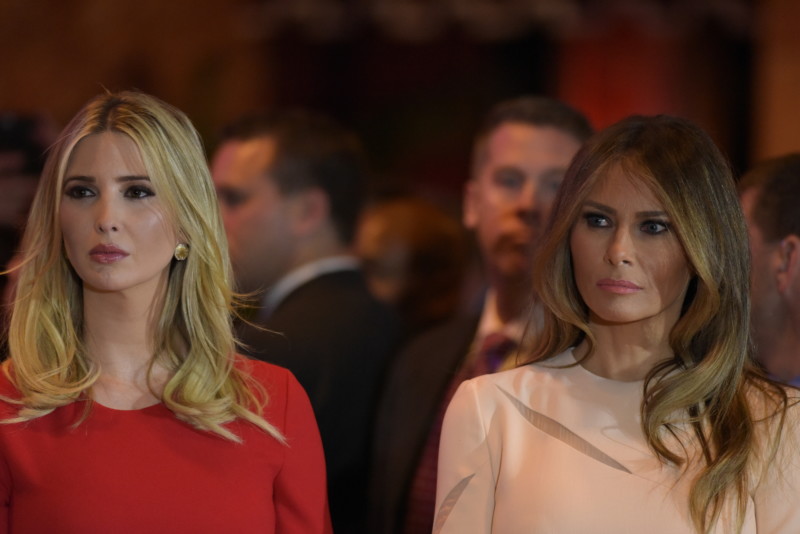
Ivanka and Melania Trump listening to candidate Donald Trump speak in April 2016 (Photo by Andy Katz/Pacific Press/LightRocket via Getty Images)
Even accepting the most charitable explanation that the Trump Organization, and thereby Ivanka, didn’t know who they were partnering with in Baku, it’s still a crime under the Foreign Corrupt Practices Act if you’re profiting from someone else’s corrupt conduct, according to an anti-corruption compliance lawyer Davidson interviewed for his story. In other words, ignorance is not a defense. US law stipulates that American companies are liable if their associates in foreign business deals are engaged in corruption, money laundering, or terrorism financing. Davidson’s reporting compellingly shows that the Mammadovs were likely involved in all three. The Trump Organization—and Ivanka—were either naïve and criminally negligent, too unscrupulous to care, or both.
Davidson’s story is a rare example of what’s mostly missing from press coverage of Ivanka: fact-based, deeply reported accounts of her ethics, her ability to assess risk, and her overall business acumen, for which she has been widely praised. How, and why, did Ivanka—like her father a graduate of Wharton, the top business school in the country—not see any of the glaring warning signs about working with the Mammadovs? Davidson says a simple Google search would have revealed troubling things about the family. In June 2014, Foreign Policy published a piece that featured the Mammadovs, along with several other powerful families. It was called “The Corleones of the Caspian.”
Ivanka’s role in that deal raises another troubling question: How do the American people know Ivanka, now a public servant, isn’t compromised by current or former relationships with foreigners? While her financial disclosure forms have been certified by the Office of Government Ethics, according to a White House official, The New York Times pointed out in July that “They do not disclose her brand’s fashion licensing partners or real estate clients, information that is not required.”
“There still may be financial ties we don’t know about,” Lawrence M. Noble, a former general counsel and chief ethics officer of the Federal Election Commission, told the Times. “These [disclosures] really weren’t meant to deal with a situation where somebody’s going to keep a major business interest.”
The public may only get questions about Ivanka answered through Freedom of Information Act lawsuits initiated by government watchdog groups and enterprising journalists. At least one such effort is already in motion. The nonpartisan group American Oversight sued to obtain Ivanka’s emails from the start of the Trump administration, when she advised the president and offered input to executive agencies but refused to become a government employee subject to ethics rules.
Here’s another underreported fact pattern: Ivanka was involved in a few very consequential White House personnel decisions that did not turn out so well. It was Ivanka (and Kushner) who advocated for hiring Anthony Scaramucci, the White House communications director who lasted just 10 days and was ousted after he went on a tirade to a reporter about the sexual dexterity of then-White House senior strategist Stephen K. Bannon. “I think the Scaramucci debacle is a full-on example of how bad Ivanka and Jared’s judgment is. They don’t understand proactive, sophisticated public policy communication, and have never presided over a large-scale bureaucracy that spans the globe. It shows in every personnel decision they’ve advocated for,” says Bloomberg View Executive Editor Tim O’Brien.
While the White House would not confirm Ivanka’s position on the firing of FBI Director James Comey, New York Times correspondents Maggie Haberman and Michael S. Schmidt recently reported that in a May 8 meeting at the White House, Don McGahn, the White House counsel, and several others, “were alarmed that the president had decided to fire the F.B.I. director after consulting only Ms. Trump, Mr. Kushner, and Mr. Miller.” (The Comey firing is now being investigated as a possible obstruction of justice, an impeachable offense; Bannon said it was probably the biggest mistake in “modern political history.”)
As for the First Daughter’s integrity, there’s been a smattering of coverage exposing instances in which Ivanka has embellished facts to aid her cause and personal standing, but not enough reporting that connects the dots. A New York Times piece last year by Pulitzer Prize-winning journalist Mike McIntire detailed a lawsuit brought against the Trump Organization for exaggerating sales numbers at the Trump SoHo property, which Ivanka worked on. Buyers thought, as McIntire wrote, that they were investing in a project that was commercially healthier than it was. In a 2008 interview with Reuters, Ivanka said that about 60 percent of the units had sold. But state and federal filings, as McIntire reported, indicated that by early 2009 only between 15 and 30 percent had sold. (The Trump Organization settled with the buyers for just over $3 million and admitted no wrongdoing.)
In a lower-stakes situation, as I reported last year, Ivanka claimed on the back of her 2009 best-selling book, The Trump Card, that she had graduated summa cum laude, the highest possible distinction, from Wharton. She actually graduated cum laude, two notches below. Neither of these episodes seems to have gained traction in the press or colored popular perceptions, even as the president and virtually all of his close counselors have been exposed on cable news for falsehoods and inaccurate statements.
To date, most of the negative stories about the First Daughter’s work history, such as The Washington Post’s excellent recent investigative report on the Ivanka Trump brand’s sourcing of manufactured goods abroad, seem to target her only indirectly. “What is it about [Ivanka] that handcuffs writers and throws them off?” a reporter who has covered her for national publications wondered aloud in a recent phone conversation.
One possible explanation is that some in the media see Ivanka—even more than Kushner—as one of their own. She is the kind of person they would have lunch with or see in passing at parties and exclusive conferences. During a recent interview with the president, Gerard Baker, the editor in chief of The Wall Street Journal, told the First Daughter, who popped into the meeting, “It was nice to see you out in Southampton a couple weeks ago,” referring to their run-in at the summer party of Lally Weymouth, senior associate editor of The Washington Post, and the eldest child of Katharine and Philip Graham.
Reporters from two top-tier publications, as well as a Trump insider, told me that Ivanka is a frequent source for journalists, usually on background, perhaps giving her some protection from a press corps loathe to burn a valuable informant. (The White House vehemently denies any leaking by the First Daughter, saying all Ivanka’s interviews are organized through official channels.)
In a recent Washington Post op-ed imploring Ivanka and Kushner “to move back to New York,” Joe Scarborough spends the first three paragraphs lavishly praising the Trump children, whom he knows personally from having socialized with them over the last decade. Scarborough goes on to say that Ivanka has “betrayed a sense of entitlement” in her role at the White House, and is “ill-prepared” for Washington. Ultimately, though, Scarborough’s more blistering criticism is reserved for Kushner, whose business and finance dealings are reportedly being investigated by Mueller’s team. But Scarborough never takes Ivanka to task for her own suspicious business practices—namely the Baku deal, which Davidson had discussed on Scarborough’s show just a few months earlier.
After white nationalist protests led to three deaths in Charlottesville, The Washington Post’s Dana Milbank authored a column headlined “The Trump administration’s most prominent Jews disgrace themselves.” In it, Milbank singles out Kushner, Gary Cohn, and Steve Mnuchin, but does not mention Ivanka, who converted to Judaism before her marriage to Kushner. Milbank told me he left her out because Ivanka quickly spoke out against the rally’s organizers, tweeting that there “should be no place in society for racism, white supremacy, and neo-nazis.”
When I asked Milbank how he thinks the First Daughter is treated by the press, he told me, “For whatever reason, the coverage of Ivanka tends to be the softer stuff, not the hard policy. She does seem to get a little bit of a pass.” Milbank said Ivanka stumps reporters because she exists in a “no-man’s-land” between presidential advisor and presidential child—a category that is typically off-limits to reporters.
How should the press cover, or hold accountable, a White House official who has no public schedule or press pool, and who can toggle at her own discretion between “adviser” and “daughter,” categories that imply different levels of access to the president?
Ivanka told the Financial Times in September that she wants to be judged only on the niche policy areas that she has set as her core responsibilities: the establishment of paid family leave, the promotion of women in science and entrepreneurship, and the creation of workforce apprenticeship programs. “While sometimes my heart wants me to fully engage on any host of issues outside of my responsibility or expertise, I try really hard to stay in my lane and execute on the initiatives I came to DC to take on,” she told the FT in an email. In other words, the outrage over, say, the transgender military ban or the EPA rolling back environmental regulations, are misplaced when directed at her. But if her Paid Family Leave initiative, which The Denver Post pointed out in July doesn’t have support on either side of the aisle, fails, the press can pin that squarely on the First Daughter.
But some see the narrow area of accountability Ivanka has laid out for herself as not only inadequate but disingenuous. New York Times reporter Jodi Kantor said one thing that struck her when she interviewed the First Daughter this spring was the lack of parameters on her portfolio. “It’s really wide ranging. She did not perceive to see any limits on what subject matter she would deal with,” Kantor told Maddow on MSNBC.
Ivanka “worked in a much more profound, overarching way to get her father elected, vouching for his leadership and character across a range of fronts and at every turn. She assertively sold him to America,” Times columnist Frank Bruni wrote in an email to CJR. “She was his character witness and even, on women’s issues, something more along the lines of his alibi. So we’re right to ask her about all aspects of his performance and record.”
People close to Ivanka made the point a number of times that no other senior administration official is asked about their personal views or pressured by the media to publicly defend or denounce the administration’s actions. “It’s a tiresome media narrative to have, always wondering what Ivanka thinks about specific policies,” says Alex Schriver, who leads strategy and marketing for Targeted Victory, a public affairs firm, and is the former national chairman of the College Republican National Committee. “We never ask, ‘Did the deputy communications director agree with that?’”
Schriver is onto something. Reporters might want to rethink this line of inquiry, which smacks of a sentimental set of ideas about Ivanka and her potential influence over her father.
For now, Ivanka is granting access to more friendly outlets, such as Fox News, where she appeared twice in June. (Since formally becoming an unpaid government employee, Ivanka has also given interviews to reporters from NBC, CBS, The Washington Post, The New York Times, and the Financial Times.)
Still, Ivanka remains opaque. In response to reporting that her special skill is criticizing her father when others can’t, Maddow asked on her segment with Kantor: “If [Ivanka] is the only person who can deliver a ‘no’ or a sharp criticism to her dad, that makes it really important to know whether she is getting good information, if she has true beliefs about the world, and if she has conflicts of interest that are driving her to advise her father in a way that aren’t in the country’s best interest.”
The First Daughter’s beliefs have often been described by the press in sweeping, nebulous terms such as “generally business-friendly and socially liberal.” But that doesn’t tell us very much about Ivanka’s broader views that might shape and inform her guidance to the leader of the free world. Does she believe in protecting and defending the post-Cold War order? Does she have convictions about upholding democratic institutions and norms, such as separation of powers, equal protection, and civil liberties? Is she likely to make recommendations to the president that will obstruct the Russian investigation because the Mueller team might find something that implicates her or her husband? What are her motives, and how can we know for sure that service to her country and the American people comes before family? What happens if those interests dramatically diverge? What do her past business dealings tell us about her willingness to turn a blind eye to potentially illegal conduct? Has she lied for her father? And to what extent is she willing to bend the truth for the sake of her own brand and image?
Ivanka has said she’s in the White House as an “honest broker” with “no hidden agenda” but that statement, like many things said by members of the Trump administration, cannot be taken at face value. Miriam Meckel, a German journalist, began a line of questioning that started to get at what the public needs to know about the First Daughter. Meckel had the rare opportunity to ask Ivanka in a live, on-the-record setting at a women’s entrepreneurship conference in Germany: “You’re representing the people of the United States, your father, or your business?”
Ivanka replied “not the latter.” But she didn’t go on to say much more of substance. So far, the Fourth Estate hasn’t been able to answer that question, either.
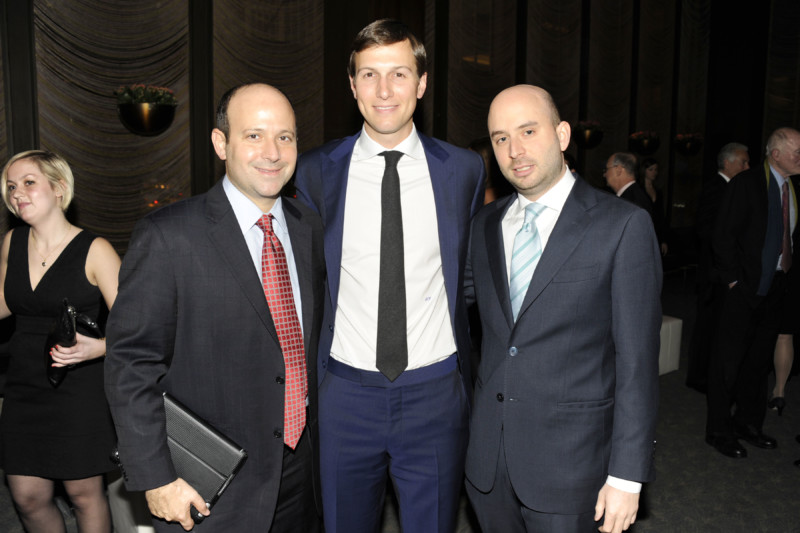
Josh Raffel, Jared Kushner, and Matthew Hiltzik in a photo taken before Trump’s run for the presidency and Kushner’s ascension to the White House (Photo by Paul Bruinooge/Patrick McMullan via Getty Images)
Ivanka’s protectors
These days, when reporters are looking for information about or access to Ivanka Trump, they contact Josh Raffel, a 33-year-old former publicist who promoted horror films in Hollywood before arriving at the White House this past May. Like many in the Trump White House, Raffel, who one Trump insider described to me as “a bulldog,” had proven his loyalty to the family before the election. Raffel got to know Jared Kushner when he worked on the Kushner Companies account during his time at Hiltzik Strategies, the same New York City-based communications firm where Hope Hicks, now White House communication director, did a stint before working for Ivanka Trump’s brand at the Trump Organization.
Initially, Raffel, whose official title is Deputy Assistant to the President, was hired to work in the Office of American Innovation, Kushner’s initiative to reduce government bureaucracy. But Raffel’s role quickly expanded to include representing Ivanka and her portfolio of issues—everything from paid family leave to global human trafficking. A White House reporter covering the G20 summit in July, where the First Daughter was on hand for the launch of the World Bank’s Women Entrepreneurs Finance Initiative, told me it was Raffel—not Sean Spicer or his then-deputy, Sarah Huckabee Sanders—fielding media questions after Ivanka had taken President Trump’s seat at the table. “My sense was that Josh came on the trip to the G20 expressly to staff [Ivanka],” the reporter told me.
The White House has pushed back against the notion that Raffel is running a shadow press office to do image management for Ivanka and Jared. “He’s very integrated into our press team. I probably talk to Josh 30 times a day,” Sanders told BuzzFeed in August. “I certainly wouldn’t say he’s doing personal PR, but he handles a lot of things in [Kushner and Ivanka’s] portfolio.”
Before Raffel started this spring, Risa Heller, a PR professional who, like others in Ivanka and Kushner’s orbit, has a background in Democratic politics, was Ivanka’s media gatekeeper, though Hicks handled anything White House-related. Two reporters told me Heller was helpful in advocating for access. “But she always had the most boring explanation for Jared and Ivanka’s actions—‘They are just trying to get their jobs done,’ was her defense of them,” one of the reporters, who writes for a national publication, says.
While Ivanka has officially stepped away from the day-to-day operations of the Ivanka Trump brand, she still holds a large financial stake. Her lawyer, Jamie Gorelick, who helped Ivanka navigate the government ethics and financial disclosure process to join the White House, has been a fierce defender in the press, pushing back against accusations of conflicts of interest in The Washington Post with a letter to the editor entitled “Ivanka Trump is following the rules.”
To be sure, it’s within Ivanka’s rights to have people defend her image and interests. And they are all just doing what they get paid to do: protect Ivanka. What’s significant from a public interest standpoint is how much of the narrative about the First Daughter is being filtered through an evolving group of PR advisers inside and outside the White House. What’s less clear is how close that information is to the truth.
In December, Politico reporter Annie Karni cited a source close to Ivanka saying she wanted to “make climate change . . . one of her signature issues.” On the day President Trump announced the US withdrawal from the Paris climate accord, making it clear Ivanka hadn’t been able to sway her father, Karni reported, “People close to the first daughter and her husband now claim . . . climate change was never their focus.”
A week later, Us Weekly ran a cover story titled: “Ivanka Takes A Stand: Why I Disagree With My Dad.” The issue sold 200,000 copies. In characteristic Ivanka fashion—a combination of dodging and deflection—she told Fox News she didn’t even know about the article until after it had been published. But, of course, according to The Hollywood Reporter and other outlets, at least one of her representatives did.
“The ‘Jared and Ivanka aren’t for that’ narrative doesn’t really add anything to the public understanding,” notes a White House reporter for a major national newspaper, “just a layer of obfuscation and distraction.”
Ivanka, Kushner, and “the people around them are constantly sending the direct message or signals to reporters that we should be thankful she and Jared are there to temper Trump and that they don’t agree with some or all of what he does,” New York Times columnist Frank Bruni told me in an email. “If we’re to note that, then we’re right to say: ‘What are you doing about it?’”
TRENDING: An analysis of Vegas shooting headlines reveals unsettling trends
Hannah Seligson is a New York City-based journalist. Her work has appeared regularly in The New York Times, among other publications. She last wrote about Ivanka Trump for HuffPost’s Highline.


